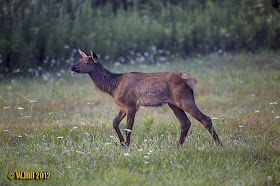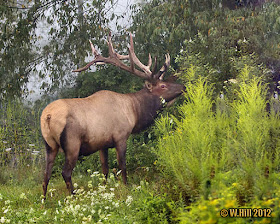I have spent most of the summer filming wildlife in the mornings and
evenings, and editing the new Pennsylvania elk film in the mid-part of
the day and after dark. In addition I have spent about one week each
month since June, documenting the elk herd, so last week I traveled to
elk country to document the shedding of the velvet and the fading of the
spots on the calves. The bulls begin to shed the velvet in early
August, but the timing of the process does seem to vary somewhat from
year to year. In general it is safe to say that the peak of shedding
activity occurs about the middle of the month. As it turned out I was a
bit late to record the beginning of the process on the mature bulls.
I
arrived on Monday afternoon and spent the evening in the saddle. This
yielded some great encounters with cows and calves, but no bulls.
Tuesday morning yielded more encounters with cows and calves, but again
no mature bulls shedding velvet were seen.
 |
| Spots Are Fading On The Calves: Canon 5D MK III- 500mm F4 ISO 400 1/640 sec. F4 |
I saw one mature bull known among the elk watching
circle as "Attitude" on Tuesday evening, but he was feeding near a cabin
and in such a situation that I did not feel comfortable photographing
him so I passed on the situation.
The following morning
I found him along Winslow Hill Road and did get a few photographs of
him, along with several video clips of him rubbing his antlers on trees
and bushes.
 |
| "Attitude"Near Winslow Hill Road : Canon 5D MK III-70-200mm F2.8 ISO 1600 1/160 sec. F2.8 |
 |
| "Attitude"Rubs Antlers on Fallen Branch: Canon 5D MK III-70-200mm F2.8 ISO 1600 1/200 sec. F2.8 |
That evening I encountered two bulls that are
frequently seen working the north end of Winslow Hill along Winslow Hill
Road. I had checked repeatedly for them, throughout the evening, but
they did not arrive in the meadow until almost dark. The largest bull
remained at a distance and was partially obscured by vegetation so I
concentrated on the smaller 6x6. In this case the low light capability
of the 5D MK III really paid off as I used an ISO of 10,000 and I am
very pleased with the results.
 |
| 6x6 With Velvet Almost Shed : Canon 5D MK III-500mm F4 ISO 10,000 1/60 sec. F4 |
I turn off all in camera noise reduction and then use
either the Noise Ninja plug-in or the noise reduction tools included in
Adobe CS6 Camera Raw Processor. In my experience Noise Ninja does
quite well until I start dealing with the higher ISOs. I need more
experience to determine the exact point, but at present I usually use
noise Ninja as my tool of first resort for speeds up to 1,000, Beyond
that I try Noise Ninja first and then turn to the Photoshop tools if I
am not pleased with the results. It seems that beyond a certain point
with Noise Ninja that I either have too much noise remaining or end up
with a plastic looking result.
Originally published at
Pennsylvania Wildlife Photographer by Willard Hill.





Stunning,the last one captures him so well,and I do like the details of Camera settings, and this is a very interesting project to be involved with.Cheers,Jean.
ReplyDeleteWonderful images, Willard! That last one was superb!
ReplyDeleteThese are amazing photos.
ReplyDeleteLinda...I keep forgetting that not everyone is aware of that name for the reclaimed strip mine that you see on the far hill from the Gilbert Viewing Area.
ReplyDeleteIn the old days there were trees on top of the hill and one walked a road around to the lower edge of the tree line. There was a meadow to the left which was great for seeing elk and the road turned when one got back to a certain point so that you were looking directly across a big meadow. When viewed from a distance and at the correct angle this had the shape of a saddle, with the trees to the north being the back part which I think is called "cantle", the meadow the seat, and a forested ridge with a sharp point that made the saddle horn. Most of the serious elk watchers used that name back in the 1990s, but I suspect this name is not as widely used today. At any rate that is what I am talking about when I mention being "in the saddle".
Now THAT is a spectacular animal.
ReplyDelete